- News
- Reviews
- Bikes
- Accessories
- Accessories - misc
- Computer mounts
- Bags
- Bar ends
- Bike bags & cases
- Bottle cages
- Bottles
- Cameras
- Car racks
- Child seats
- Computers
- Glasses
- GPS units
- Helmets
- Lights - front
- Lights - rear
- Lights - sets
- Locks
- Mirrors
- Mudguards
- Racks
- Pumps & CO2 inflators
- Puncture kits
- Reflectives
- Smart watches
- Stands and racks
- Trailers
- Clothing
- Components
- Bar tape & grips
- Bottom brackets
- Brake & gear cables
- Brake & STI levers
- Brake pads & spares
- Brakes
- Cassettes & freewheels
- Chains
- Chainsets & chainrings
- Derailleurs - front
- Derailleurs - rear
- Forks
- Gear levers & shifters
- Groupsets
- Handlebars & extensions
- Headsets
- Hubs
- Inner tubes
- Pedals
- Quick releases & skewers
- Saddles
- Seatposts
- Stems
- Wheels
- Tyres
- Health, fitness and nutrition
- Tools and workshop
- Miscellaneous
- Cross country mountain bikes
- Tubeless valves
- Buyers Guides
- Features
- Forum
- Recommends
- Podcast
feature
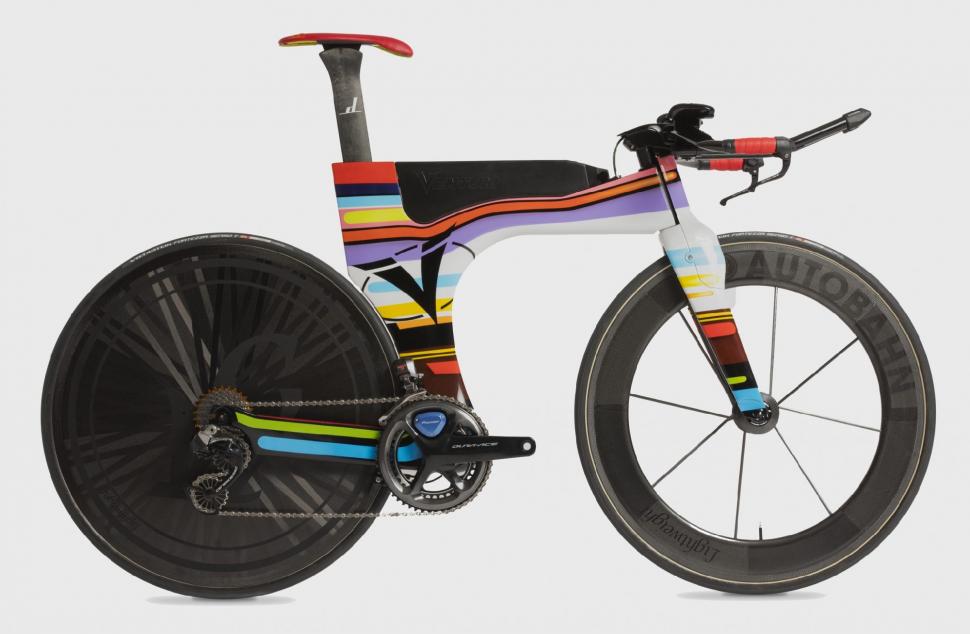 ventum-one-signature-edition (1).jpg
ventum-one-signature-edition (1).jpg6 far-out triathlon bikes
The rules covering the bike you can use in an Ironman triathlon are different from the UCI’s so you’ll see designs at the World Championship in Hawaii this weekend that wouldn’t cut it in a time trial. Here are six of the most radical.
Cervelo P5X
Cervelo says that it spent 180-hours in a wind tunnel during the development of the P5X and went through 150 frame iterations before arriving at the finished product.
You’ll immediately notice that the bike has no seat tube or seatstays – removed to reduce drag – and the down tube curves around the rear edge of the front wheel to manage the airflow in that area.
Cervélo has opted for disc brakes with thru-axles and flat mounts. Disc brakes improve safety and boost stiffness, says the company, and also allow for aero improvements.
Find out more about the Cervelo P5X here.
Diamondback Andean
The Andean is designed around what Diamondback calls its Aero Core – the section of the frame that sits directly between the wheels. This is intended to be a single large airfoil.
“This bike was designed from the centre of the wheels—the least aerodynamic area—in towards the middle of the frame, then up,” says Diamondback.
The brand says that this approach leads to an improvement in the laminar flow across the entire system, dramatically reducing drag at every yaw angle.
There’s loads of storage space on offer inside the frame and in compartments on top of the top tube. This avoids the need to add non-aero elements, or to tape supplies to the frame.
The Andean takes disc brakes and is designed to use a SRAM 1x (single chainring) drivetrain.
Find out more about the Diamondback Andean here.
Scott Plasma
Scott offers UCI-legal versions of its Plasma but this Premium model is triathlon-specific, a replica of the one ridden by 2014 Ironman World Champion Sebastian Kienle.
Carrying plenty of easily-accessible fuel is vital during the 112-mile bike leg of an Ironman, hence the hydration unit in front of the head tube, the bento box on the top tube, a bottle mounted to the down tube and additional storage just above the bottom bracket.
Ventum One
The Ventum One (this is a custom finish) lacks a down tube and seatstays, ditched in pursuit of aero efficiency, and that compartment you can see on the top tube is an integrated bottle that holds 1.4 litres of liquid. A straw and a bite valve allow you to drink without altering your ride position.
With most of the drag resulting from the rider rather than the bike, anything that allows you to remain aero for longer has to be welcome.
Ceepo Viper R
The Viper R is an update of the straight Viper with an integrated front hydration system developed with Profile Design and an integrated stem/ bento box.
Ceepo claims that this results in “a 15% improvement in wind tunnel testing compared to the same Viper with a conventional race day setup”.
Canyon Speedmax CF SLX
Canyon’s Speedmax CF SLX usually looks futuristic, but in this company it appears almost conventional. It is UCI legal, provided you remove the additional hydration and bento box pictured here.
You get a Gear Box storage unit for spare inner tubes and CO2 cartridges in front of the seat post, and a nutrition storage box behind the stem for stashing energy gels, bars and hydration tablets. Two water bottles can be carried behind the saddle on a removable adapter.
The handlebar has a Hydration Source, developed with Profile Design, sandwiched between the extension bars and in front of the stem, with a short hose allowing easy hydration on the move.
Mat has been in cycling media since 1996, on titles including BikeRadar, Total Bike, Total Mountain Bike, What Mountain Bike and Mountain Biking UK, and he has been editor of 220 Triathlon and Cycling Plus. Mat has been road.cc technical editor for over a decade, testing bikes, fettling the latest kit, and trying out the most up-to-the-minute clothing. He has won his category in Ironman UK 70.3 and finished on the podium in both marathons he has run. Mat is a Cambridge graduate who did a post-grad in magazine journalism, and he is a winner of the Cycling Media Award for Specialist Online Writer. Now over 50, he's riding road and gravel bikes most days for fun and fitness rather than training for competitions.
Latest Comments
- David9694 6 min 18 sec ago
I've got a great idea to tackle air pollution - re-open a pedestrianised street. ...
- mctrials23 47 min 48 sec ago
Our roads would be lovely a peaceful if bad and dangerous drivers were actually caught more than once in a blue moon. On the 1km or so to my...
- mctrials23 58 min 1 sec ago
The upside of this would be that people would obviously look it up to pass therefore informing themselves. It would also remove any doubt about the...
- chrisonabike 2 hours 26 min ago
I think they've been at Molière's "La malade imaginaire" again...
- ktache 3 hours 5 min ago
Twenty five years for my Joe blow de lux, a few services. Topeak make excellent air products. I also have the turbibooster X and their digital...
- David9694 4 hours 55 min ago
shopkeeper logic: ALL THIS CONGESTION CAN'T BE GOOD FOR BUSINESS! PERFECT!
- hawkinspeter 6 hours 41 min ago
Nice way to shirk responsibility for your mind-bogglingly stupid choice
- hawkinspeter 10 hours 2 min ago
Phone cameras store the rotation of the device into the EXIF flags of photos and IIRC road.cc honours that flag. If you load the photo into a...
- levestane 10 hours 12 min ago
On my all-rounder bike 44-11 is the longest gear, with 24-43 being the shortest, this with 150 cranks. I'd generally be using 44-15 on flat road ...

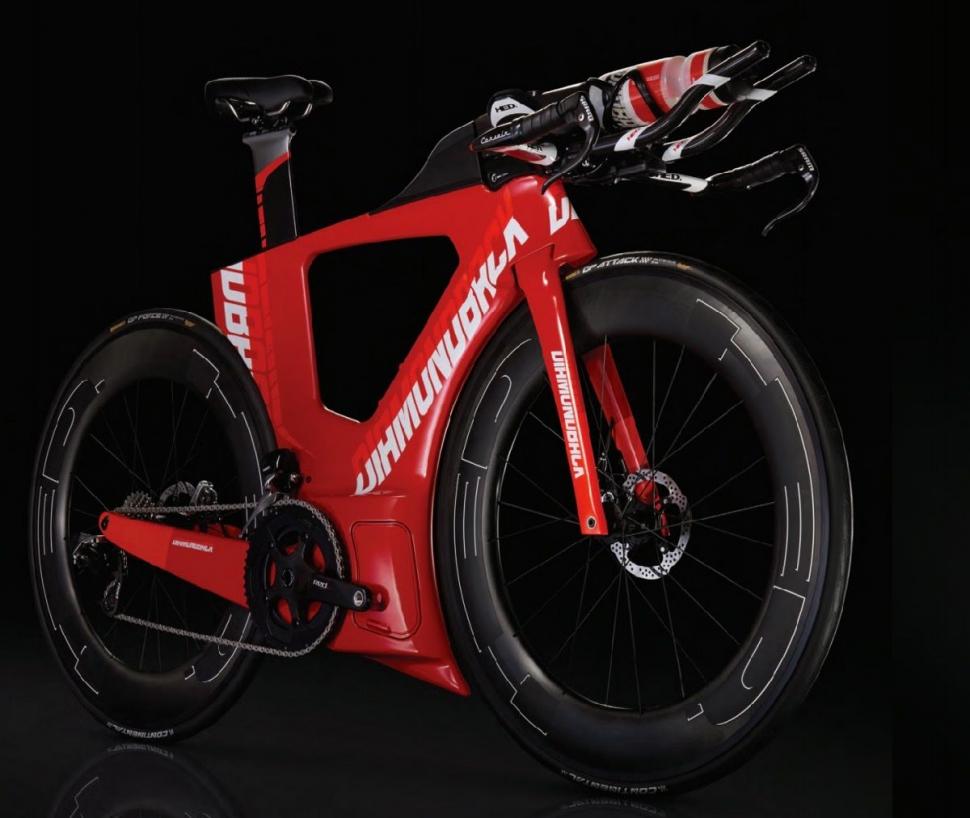
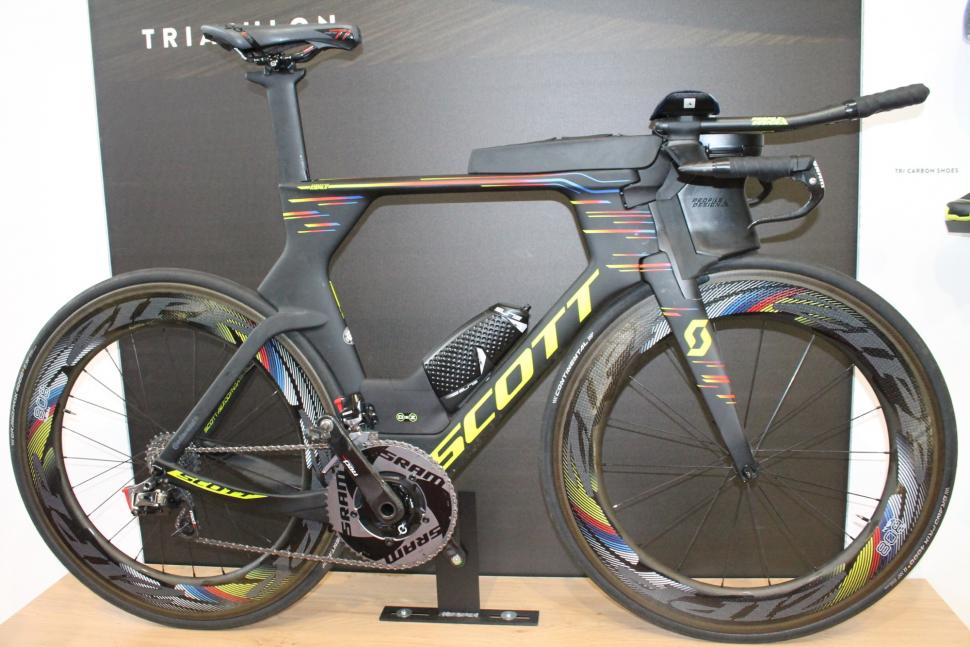
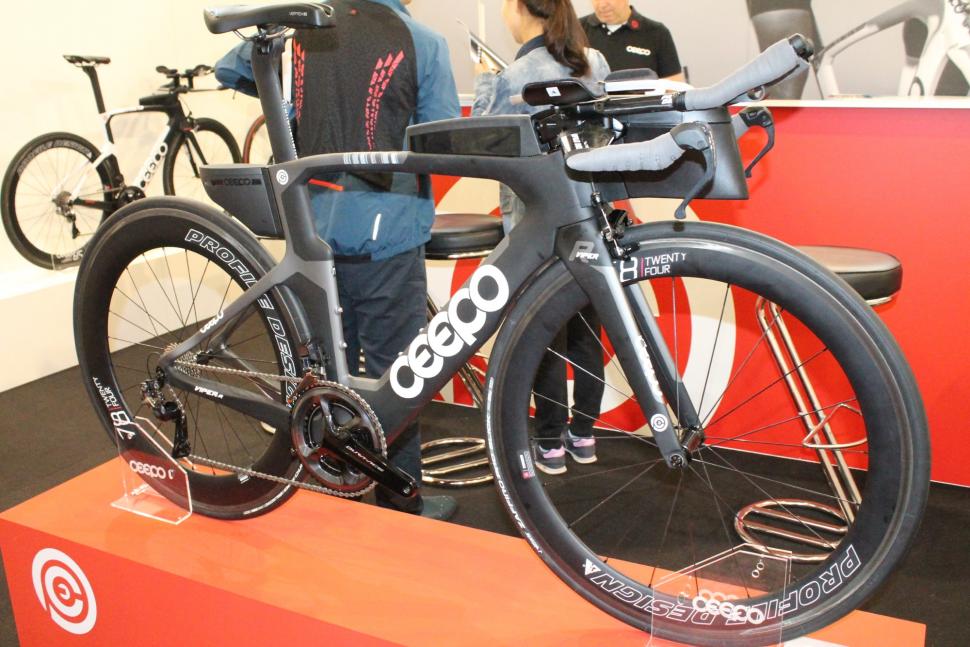
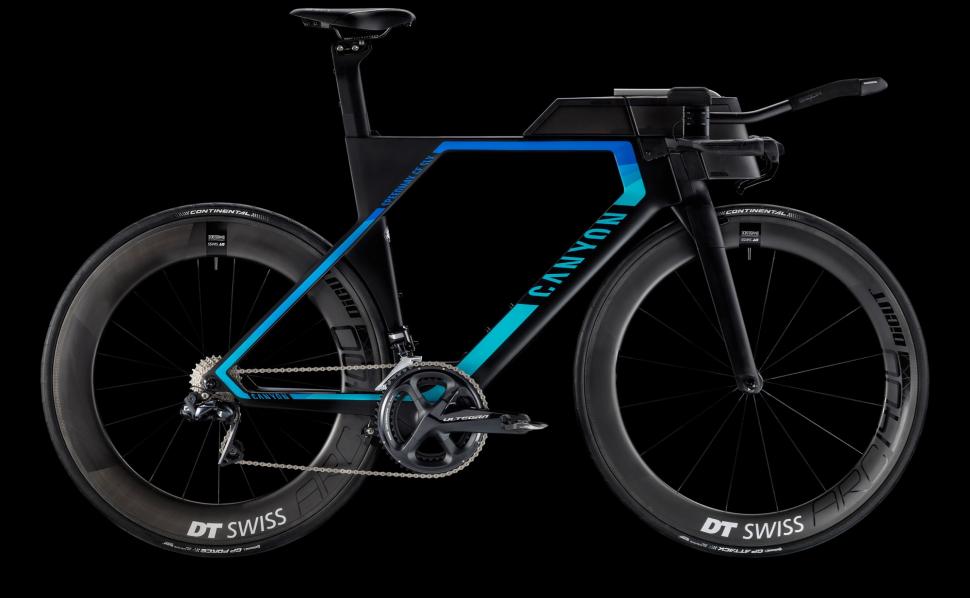
Add new comment
18 comments
Plenty of space for the hidden battery and motor...
I do visually like tri bikes. Bit like watching the Batmobile in the films. I applaud it's existance but acknolwedge it's not something I'll ever use . Unless it was a candystripe Batmobile!
Supreme performance bikes for supreme performance athletes.
Man, those bikes are ugly
..also isn't this the sport where drafting is illegal but everyone does it when out of sight of the commisaires?! It's a supreme test of aerobic fitness for sure, but far removed from the sport that this site usually covers.
P5X clearly only for use in events where cross winds are banned.
Just checked and the worlds is tomorrow in Kona, Hawaii. The bike course is famously cross-windy. Without digging out manufacturer white papers and boring stuff like that, tri bikes are designed to be good through a range of yaw angles because, well, Kona. I doubt if many of the athletes are knocking out 330W, mostly they'll be on lower power and not going superfast because they have a marathon to run after the bike leg.
They'll be better in crosswinds than you think. Well, unless all the crap bolted to their bikes catches the wind.
You could be right - because I think they will be about as good as my lounge door with a wheel on each end in a cross wind. I can notice a firm difference between normal and deep rims on a cross windy day - those bikes will be like topsails....
I think the top pros are around 300w for the 112 miles - they still go superfast though - well >25mph sounds superfast to me in the circumstances..
Kona is notoriously windy - so much that they have banned disc wheels there. So the frames are fine with cross winds.
Air permiable carbon slabs obviously.
As an owner of one of those bikes; Canyon Speedmax; I'll tell you that it's fine in windy conditions and I'm only 68kg, so I'm not exactly anchoring the thing down. I find that nothing affects the handling of a bike for me like the front wheel rim depth. I can only just handle a Zipp 404 in gusting winds, so switched to Campagnolo Bora 35; much better.
And these bikes are comfortable once you get a good position dialled-in; as stated by others, they have to be if you're riding for 112 miles and then getting off and running a marathon.
..which is very much not the Cervelo or the Barn D'or...
Most of those bikes look like they should be in a circus, not a world championships...
The 'Venton one' looks very reminicent of Chris Boardman's Lotus bike from the 90's
That Scott - ugly bike, but those wheels... yes please!
I bet these are horrible to ride. They look like they suck the joy out of cycling in the pursuit of a few more watts. No thanks.
Actually no. I'll bet these are quite comfortable to ride. If you're knocking out 330W for 4h in the aero position, and about to run a 2:45 marathon (or faster), they have to be. There's absolutely no tolerance for sub-optimal position or handling because that consumes energy that you don't have to spare.
Well for a flat fast non-windy ride continuously in the tt position I'm sure they're the ideal tool - I'm just saying that's not my idea of a fun bike ride. But if that's what floats your boat..
As for 'sub-optimal handling' lol I'll keep my road bike thanks all the same...!
GordonBenet Ramsey, triathlon. It's not me, it's you.